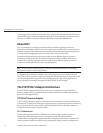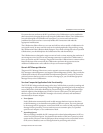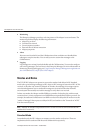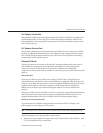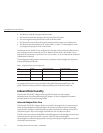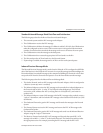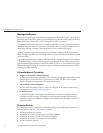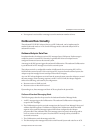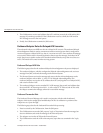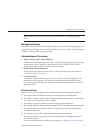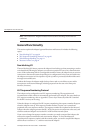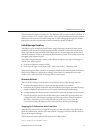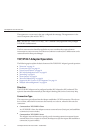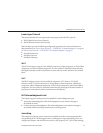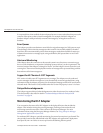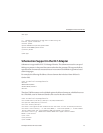
5. The Collaboration receives and validates the ACK, and then journals the ACK and the HL7
message (if journaling is enabled). If the Collaboration receives a NAK, the NAK and the
HL7 message are sent to the error queue.
6. Finally, the Collaboration commits the JMS receive.
Outbound Adapter Roles for Delayed ACK Scenarios
The outbound Adapter can fulll two roles in a delayed ACK scenario. The outbound delayed
acknowledgement mode is used to communicate with an external system that is congured to
receive messages in a delayed ACK way; that is, it receives two ACKs. One conrms the message
was received, and the other is from the application that accepts the message. For delayed ACK
mode, the process is similar to that of the standard outbound mode, except that it receives two
ACKs. The initial ACK comes from the receiving system.
Outbound Delayed ACK Role
The following steps describe the outbound delayed acknowledgement role process displayed:
1. The outbound Adapter, which is congured as Delayed Acknowledgement role, receives a
message from JMS, and sends the message to the External System.
2. The External System receives the message and returns the rst Acknowledgement to the
outbound Adapter with an MSA - 5, value “D” for Delayed Acknowledgement. The
outbound Adapter receives the ACK, validates the ACK (verifying that it is a Delayed ACK),
and waits for another ACK.
3. The outbound Adapter receives another HL7 ACK message (the second) and validates that
the second HL7 ACK message is an MSA - 5, with a value of “F.” If the second ACK is valid,
the Adapter commits the message, otherwise it resends the message.
Outbound Forwarder Role
The Outbound Forward Message role is used in conjunction with the with the inbound
Adapter, which is also congured to handle delayed ACKs. No validation is preformed: the
Adapter acts as a “pass-through.”
The following steps describe the Outbound Forwarder Role processing:
1. Data is received by the Collaboration, from the JMS queue.
2. The Collaboration extracts the JMS property “reply to” destination from the message, but
does no validation, and sends the message to the External System.
3. The Adapter receives the ACK from the External System.
4. The Collaboration sends the ACK to the temporary topic that was contained in the “reply
to.”
SunAdapterforTCP/IPHL7Overview
SunAdapterforTCP/IPHL7User's Guide • October200918



